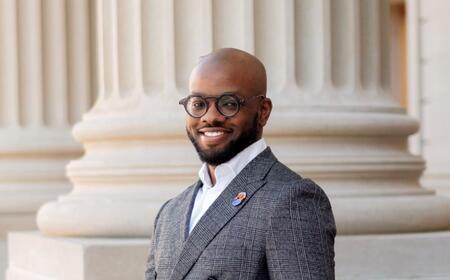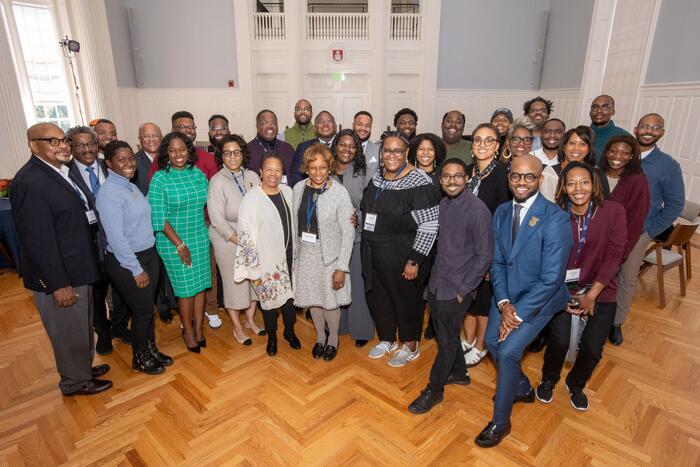The Rev. Andre Cortez Gilford Jr. ’24 M.Div. is the current president of Yale Black Seminarians, a Divinity School student group of more than 30 members that has pushed for change at YDS for 55 years. As president he is keen to continue the momentum first set in motion by YBS founders in 1969. At that time, YBS advocacy played a vital role in the YDS decision to hire its first Black faculty members and in winning greater respect for Black students and their experiences. Today the number of YDS Black faculty has reached historic heights, and the School is now home to a Black Church Studies program, yet there’s still much work to be done, he said—a need for more campus spaces where Black students feel valued, heard, and respected; new initiatives to help students prepare for vocations of reforming and healing the tumultuous world. YBS is marking its 55th anniversary with various events in the 2023-24 academic year.[1]
 Born in Detroit, Gilford is an ordained Baptist minister who received vital mentoring from YDS graduates—notably the Rev. Nicholas Hood III ’76 M.Div. of Plymouth United Church of Christ in Detroit and the Rev. Otis Moss III ’95 M.Div. of Trinity UCC Church in Chicago, where he did a YDS internship. His own vocational passion is to bring Gospel hope to those who feel despair or disconnection, especially young people. Here are excerpts from a recent conversation with Reflections editor Ray Waddle.
Born in Detroit, Gilford is an ordained Baptist minister who received vital mentoring from YDS graduates—notably the Rev. Nicholas Hood III ’76 M.Div. of Plymouth United Church of Christ in Detroit and the Rev. Otis Moss III ’95 M.Div. of Trinity UCC Church in Chicago, where he did a YDS internship. His own vocational passion is to bring Gospel hope to those who feel despair or disconnection, especially young people. Here are excerpts from a recent conversation with Reflections editor Ray Waddle.
Q: Have the aims of Yale Black Seminarians changed in half a century? How does the YBS of the 21st century differ from its 20th century manifestations? What are its goals today?
Andre Gilford: The first organizers of YBS wrote a radical manifesto—they wanted to push the School to make new spaces for Black students and guard them from macro- and microaggressions that were routinely taking place.[2] They wanted to bring on the School’s first fulltime Black professor. They wanted to start diligent recruitment of students from HBCUs. In short, they wanted YDS to consider Black students as equal stakeholders in the fabric of YDS life. Our aims have not changed that much. We still want the freedom not to have to code-switch, the freedom not to have to guard our words, the freedom from microaggressions—the freedom of being beautiful and Black.
This means continuing the momentum of YBS history so that Black students are heard and valued and respected and the Black church is respected as a landing place for Black students.[3] Goals include advocating for endowed funding to ensure continued student participation in the annual Samuel Dewitt Proctor Conference in Chicago. We want to encourage YDS to build out more communal and organic spaces for ministry preparation and ministry mentorship for Black students. For that purpose, my hope is that the School will establish a center for Black church studies. We also want to make sure that the institutional memory of Yale Black Seminarians continues. It’s important to lift up the stories of our elders, including those who have passed and gone on to glory. Those stories are so important, yet the pandemic disrupted the flow of such institutional memories. I’m grateful to work with a dedicated YBS team: we’ve been going through the archives to make sure the stories are remembered and honored.
Q: Your personal Instagram page declares your commitment to “practical theology for living abundantly.” What does that mean to you?
AG: I use that scripture from John 10 quite often. That’s the crux of the gospel, why Jesus came, why he was risen from the grave—to live audaciously, without shame, without restraint or restriction. It’s our release from captivity. My call has been to show people practical ways, as I learn them, to offer ourselves up to be God’s instruments in the world—through meditation and prayer, acts of love, visiting the prisoner, fighting for what’s right, not going quiet when there’s injustice. Practical things! The system of injustice will be toppled, but we aren’t called to do it on our own. We do have an obligation to make the kingdom of God on earth as much as we can—that’s an everyday choice to choose heaven. At some point we will die and others will come up after us and continue to work—God is doing work beyond us.
Q: What can the world, and America, learn from the theologies of Black churches, their visions of faith, the hostility they’ve endured and overcome?
AG: I want to caution that Black churches don’t have it all right—we have a lot of issues to work on. But I use the ideals we posit and the history we come from: the Black church tradition is rooted in the radical and adamant pursuit of personhood, that every person is made in the image of God. We’ve always pursued this. In hush harbors the enslaved could secretly get away from their “owners,” seek God, and find community with each other. They could regard each other as kin, as siblings—as part of a divine cosmic force. Black churches can speak to that profoundly today: we all have a common ancestry and we’re all part of a cosmic presence. When we forget that—when we become separated from that insight—then we have problems. Global warming, racism, and war all reflect this separation and neglect. Young people definitely feel that separation.

Q: You’ve mentioned your own vocational interest in the spiritual welfare of young people, their dreams and struggles. Is the gospel message having trouble getting through to new generations?
AG: When we reopened at Trinity UCC after the worst of the pandemic, the youth were not there. It took a minute for them to come back. Apathy was in the air. I wanted to disrupt that apathy. I realized that the way to reach teens is simply to be yourself: I’m just here to tell you that Jesus loves you, and your past does not define you. You’re free already in Jesus Christ. You’re already a child of God, and with God you can live in freedom and joy. So, what do you want to do with your life? Once we start talking about that, they start soaking it up. Because there’s such a dearth of this kind of story being told.
Unfortunately, there is political profit to be made from our isolation, loneliness, lack of community, and lack of love. What gives me hope is when I speak the gospel, people listen. There is something powerful in hearing that you are not defined by your background or your mistakes, that you can do more than what you’ve been told. That’s the gospel. Jesus does not expect you be “all right,” but he does expect you to choose God. Seeking God becomes an invitation to God to do the work within you, which leads to a transformation that will blow your mind: the renewal of the mind, not on your own but with the spirit of God. I know for a fact that our greatest hope is in young people. They’re not here for divisiveness. The template for unity is there—if we can hold on to it. Yes, people are ready, thirsty for a different way. Just share the love of God with them. It’s not complicated!
[1] These have included a panel discussion held during Convocation in October 2023 on “The Evolving Black Church: Innovative Practices for the Future”; the 2024 Parks-King Lecture, a speakers series established in 1983 at the behest of YBS (the January 2024 lecture featuring Harvard Divinity School Dean Marla Frederick on the theme, “The Promise and Precarity of Black Institutions: Historical Pasts, Ethnographic Presents, and Collective Futures”); a YBS-sponsored luncheon in February at the Samuel Dewitt Proctor Conference in Chicago; and the upcoming gala April 26 in Old Refectory at YDS.
[2] The original YBS student executive board members in 1969-70 were: Warner H. Sanford ’70 M.Div., Administrator; John Andrew Brown ’70 M.Div. and Norman Victor Osborne’72 M.Div., Co-Chairs; Theotis Holland ’72 M.Div., Executive Secretary; Walker Solomon ’72 M.Div., Treasurer; Walter Burford ’69 B.D., ’71 S.T.M., Curriculum; and Robert Jones ’69 B.D., ’70 S.T.M., Member-at-Large.
[3] Current YBS officers include: Matthew Rivera ’25 M.Div., Vice President; Elishia McAllister ’26 M.Div., Secretary; Morenike Oyebode ’25 M.Div., Treasurer; Tre Smith ’25 M.Div. and ArDonna Hamilton ’26 M.Div., Co-Chaplains; Tasharah Person ’26 M.Div., Alumni Engagement Chair; Clifford Chambliss III ’25 M.Div., 55th Anniversary Chair; Ellen VanDyke Bell ’25 M.A.R., Inclusion & Diversity Chair; Alden Fossett ’26 M.Div., Historian; and Durante Barringer ’26 M.Div., Social Chair.